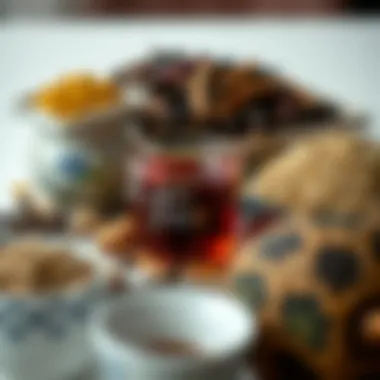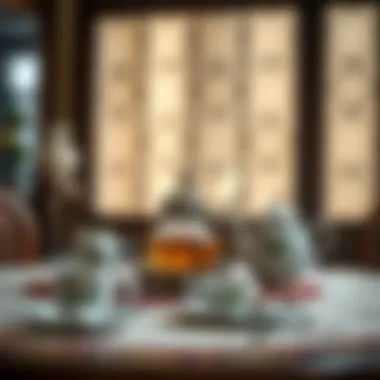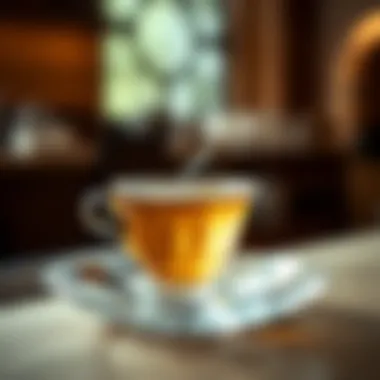Discovering Dubai's Finest Tea: Tradition Meets Quality


Intro
Dubai, a bustling metropolis where the old world meets modernity, presents a unique tea culture that showcases the richness of its tradition and the influence of its diverse population. As tea enthusiasts, we often seek not just the taste, but an experience infused with history, social values, and a touch of innovation. In this city, you’ll find tea houses that echo the tales of old, contrasted by chic cafés that redefine how we enjoy our brews. Whether it’s the fragrant chai sprinkled with spices or the delicate notes of white tea, the tea scene in Dubai beckons for exploration.
As we embark on this journey through Dubai's tea culture, we'll dive into the establishments that have made a mark, the types of tea that flow abundantly, and the cultural tapestry that elevates every cup. Get ready to discover the best tea spots, unique brewing methods, and the social importance of tea gatherings, all while witnessing the trends reshaping the local market. Join me as we sip through this adventure, revealing the layers of flavor and tradition that make tea an essential part of Dubai's lifestyle.
Prologue to Dubai's Tea Culture
Dubai, a city that seamlessly blends tradition and modernity, boasts a rich tea culture that is as diverse as its populace. Tea drinking is not merely a habit here; it's embedded in daily life, reflected in both casual gatherings and formal events. Understanding the subtleties of Dubai's tea culture is paramount for anyone interested in its social fabric and culinary landscapes.
With a proliferation of tea establishments ranging from opulent hotels to quaint roadside stalls, this city offers an intricate tapestry of flavors. Each cup tells a story of hospitality, history, and personal significance.
By exploring Dubai’s tea culture, readers can gain a deeper appreciation of the interplay between past and present, as well as the way tea acts as a social lubricant, strengthening bonds within families and communities. The layers of tradition intertwined with modern practices not only showcase the uniqueness of Dubai but also provide valuable insights for enthusiasts and prospective investors alike.
Historical Overview of Tea in Dubai
The history of tea in Dubai can be traced back centuries, evolving alongside the diverse influx of traders and travelers that have passed through the region. Initially, tea was a luxury that symbolized affluence and distinguished social status. The influence of Persian and Indian cultures played a considerable role in introducing various brewing techniques and flavors that still resonate today.
In more recent years, the United Arab Emirates has embraced a broader selection of international teas, with varietals from England, China, and beyond gaining popularity. The evolution from a simple beverage to a cultural icon illustrates how deeply rooted tea has become in everyday life.
"Tea is the magic elixir that brings people together, no matter their background or origin."
The Role of Tea in Local Customs
Tea serves as a focal point in many of Dubai's social customs. Whether it's entertaining guests during Iftar in Ramadan or celebrating milestones, offering tea is often seen as a gesture of goodwill and hospitality. The preparation and presentation of tea, especially traditional Arabic varieties like khaleeji chai, are laden with rituals that elevate the experience.
In many households, the tea-making process is a communal affair, with family and friends gathered around to partake in the ritual. This cherished aspect of tea culture fosters connections and reinforces community bonds.
Additionally, tea ceremonies are often interwoven with significant life events, marking milestones with special teas or blends that hold particular meaning for the family. Such customs enhance the cultural richness, making tea not just a beverage but a symbol of unity and shared savoring of life’s moments.
Types of Tea Offered in Dubai
Exploring the types of tea available in Dubai offers insight into the cultural tapestry that defines this vibrant city. Each type of tea serves as a gateway into the traditions, tastes, and preferences of its diverse population. Understanding these offerings not only enriches the experience for potential buyers and tourists but also highlights opportunities for investors and entrepreneurs in this thriving sector. As the tea culture in Dubai continues to evolve, the demand for various types reflects a confluence of innovation and tradition, making this an essential section of our exploration.
Traditional Arabic Teas
Traditional Arabic teas are more than mere beverages; they weave a rich narrative of heritage and community bonding. The most notable of these is Arabic coffee (or qahwa), often spiced with cardamom, serves as a quintessential welcoming drink.
Tea itself is typically steeped in rituals, with chai karak (spiced tea with milk) being a popular choice among local residents and expatriates alike. This robust beverage is rich and creamy, providing comfort in the bustling urban landscape. Its prominence in the social scene cannot be overstated, as it is often shared in gatherings, fostering connections among friends and families.
Noteworthy Tea Establishments in Dubai


Dubai's tea culture is not just about the beverage itself; it's a rich tapestry interwoven with tradition and modernity. The tea establishments in this vibrant city showcase both the heritage of tea drinking and the innovative paths the market is exploring. Here, we will delve into notable tea destinations that reflect these contrasting yet complementary themes.
Traditional Tea Houses
When one steps into a traditional tea house in Dubai, they are transported back in time. These establishments are often adorned with intricate designs that mirror the cultural richness of the region. The atmosphere is warm and inviting, often filled with the aromas of spiced tea. Places like Al Dhafra Tea House offer not just tea but a deeper social experience. Here, local customs reign supreme, and you'll find families and friends gathering over a pot of chai—a spiced infusion brewed with black tea, milk, and a medley of spices.
The importance of these traditional spots lies in their ability to foster connections. They preserve the customs of hospitality, making each visitor feel like part of the family. People often describe these experiences as honoring both ancient practices and contemporary community gatherings.
Luxury Tea Rooms
On the other end of the spectrum are Dubai's luxury tea rooms, which redefine opulence with every cup served. Establishments such as Fortnum & Mason and The Lounge at the Burj Al Arab elevate tea drinking to an art form. Here, the ambiance is curated meticulously with plush seating and stunning views.
These rooms offer a refined selection of international teas, serving everything from classic Earl Grey to rare blends like Silver Needle White Tea. The elegance extends to their service, where knowledgeable staff provide insights into the origin and tasting notes of each brew. Drinking tea here is more than a mere refreshment; it becomes an experience that resonates with sophistication and indulgence.
Modern Cafés Specializing in Tea
A new wave of tea culture is emerging in Dubai’s modern cafés. These spaces, like Tea and Coffee and T-Lounge by Dilmah, are changing how tea is perceived among younger generations. They focus on crafting unique blends and innovative beverages, often fusing traditional elements with contemporary twists.
In these cafés, you might find bubble tea infused with local spices or matcha served with dates. The interactive environment encourages patrons to explore new flavors, engage in discussions, and express their creativity through customizable drinks. These modern establishments play a pivotal role in the evolution of Dubai's tea scene, bridging the gap between age-old traditions and new-age experimentation.
"Dubai's tea scene is a clear example of how it's possible to respect tradition while embracing innovation—all in a city that's constantly reinventing itself."
Each of these noteworthy tea establishments in Dubai contributes uniquely to the city's dynamic tea culture. Whether steeped in history or carved from modernity, they each offer a taste of something special that resonates with both locals and visitors. In a world that often feels rushed, these tea spots remind us to pause, savor, and appreciate the subtleties of a simple cup.
Tea Preparation Techniques
Tea preparation is a crucial aspect of enjoying this beloved beverage in Dubai. With a rich tapestry of traditions woven into every cup, understanding how tea is made reveals not just flavors but also cultural nuances. The art of brewing tea can greatly influence its taste, aroma, and overall experience. As anyone who has sipped a cup can tell you, how tea is prepared can transform an ordinary moment into something truly special.
Traditional Brewing Methods
Traditional methods of brewing tea in Dubai often reflect the region's cultural heritage. The most notable among these is 'Karqad', a beloved tea served alongside meals, particularly in Emirati households. It's typically a blend of black tea and fragrant spices like cardamom and saffron. The preparation might seem simple, but the timing and the order in which ingredients are combined play a pivotal role in drawing out the right flavors.
Another traditional method involves using a dallah, a beautifully designed Arabian coffee pot, to brew the tea. Pouring from a height creates a delightful froth and aroma that enhances the tea drinking experience. The act of using a dallah itself is deeply embedded in the customs of hospitality in Dubai, as serving tea from this pot signifies generosity and respect toward guests.
In many households, the tea leaves are steeped for a specific duration that varies by preference and type of tea. This patience ensures a rich infusion that’s both bold and aromatic. However, a common mistake among new brewers is over-steeping the tea, which can lead to bitterness — a lesson learned through the age-old trial and error of tea enthusiasts.
Contemporary Approaches to Tea Making
As with many global cities, Dubai has also seen a shift toward modernity in its tea brewing practices. Young tea emporiums and cafés often adopt innovative techniques that blend science with the art of tea making. For instance, sous-vide methods are now being used to brew tea at precise temperatures, allowing for the extraction of delicate flavors without the bitterness that can sometimes accompany traditional methods.
Another exciting trend is the use of specialty infusers or teapots with integrated timers that ensure the perfect steeping time every time. This caters to the growing number of health-conscious consumers looking for a sweet spot of flavor while maintaining the health benefits of tea that result from optimal brewing.
Cold brewing has also gained traction, allowing for a refreshing alternative that produces smooth, less astringent tea blends. Many Dubai tea shops embrace this method, offering unique cold brew options with creative flavors such as hibiscus and mint, catering to the younger demographic looking for refreshing, flavorful beverages.


In closing, whether it’s through the painstaking care of traditional brewing methods or the innovative twists of contemporary approaches, the techniques used in tea preparation in Dubai mirror the city’s dynamic and evolving culture. These methods not only yield delicious tea but also create memorable experiences that resonate deeply with both residents and visitors.
"In every drop of tea, there is a story waiting to be told — a reflection of the land, its people, and its traditions."
For more insights and detailed exploration of Dubai's tea culture, visit Britannica or engage with the community on Reddit.
Cultural Significance of Tea in Social Gatherings
Tea is more than just a beverage in Dubai; it is a profound marker of culture and civility during social interactions. In the Emirate, offering tea is an unspoken rule, representing a gesture of goodwill, friendship, and hospitality, which goes beyond mere pleasantries. As an integral part of daily life, tea rituals embody warmth, fostering connections in both personal and professional settings.
Tea as a Symbol of Hospitality
In many Middle Eastern cultures, hospitality reigns supreme, and Dubai is no exception. When a guest walks through the door, the first item offered is often tea, characterized by its aromatic flavor and warmth. This practice does not merely signify a welcoming demeanor; it carries significant emotional weight.
- Immediate Comfort: Serving tea creates an atmosphere that encourages open dialogue. Through the simple act of pouring a cup, hosts communicate a desire to ensure their guests feel comfortable and at home.
- Building Connections: Sharing tea invites deeper discussions. It creates a space for exchanging ideas, resolving conflicts, or even striking business deals, where both parties can find common ground over a shared cup.
"In Dubai, a shared cup of tea can break down barriers and forge unbreakable bonds." Saying 'yes' to tea is often the first step to saying 'yes' to friendship.
Tea Ceremonies and Their Importance
Tea ceremonies in Dubai often go beyond casual sharing to becoming formal events filled with ritual and significance. These gatherings serve as a testament to the unique blend of modernity with traditional values. During ceremonial occasions, the preparation and presentation of tea are carefully orchestrated steps reflecting meticulous heritage.
- Ritualistic Preparation: Each step, from selecting quality teas to the making and serving, is deliberate. For instance, traditional Arabic tea is frequently enriched with spices like mint or cardamom, creating a sensory experience that’s not only flavorful but also cultural.
- Social Dynamics: These ceremonies often host a diverse gathering, representing varied backgrounds. This mix turns the event into a melting pot of cultures, enhancing mutual respect and appreciation among attendees.
- Tradition Meets Modernity: While traditional methods hold prestige, many modern gatherings also innovate with exotic flavors and brewing techniques. This blend showcases Dubai’s cosmopolitan essence while honoring the tea's heritage.
Ultimately, the cultural significance of tea in Dubai transcends beyond its delightful taste. It shapes social gatherings and nurtures relationships. With every sip, the brew symbolizes shared history, traditions, and respect, serving not just as refreshment but as a vessel of culture itself.
Emerging Trends in Dubai's Tea Market
The tea market in Dubai is not just about tradition; it's becoming a dynamic landscape of trends that reflect the evolving preferences of consumers. The demand for quality beverages has surged in recent years, and tea is no exception. Understanding these emerging trends helps both the connoisseur and the investor understand the shifting tides that could dictate the future of tea consumption in the UAE.
Health Consciousness and Organic Teas
One cannot overlook the growing awareness of health and wellness among consumers. Dubai's tea enthusiasts are increasingly gravitating towards organic teas, valuing not just taste but the health benefits that accompany a well-chosen brew. Organic choices like green tea and herbal infusions are flying off the shelves as many seek to avoid pesticides and additives.
- Consumer Preferences: The market is seeing a sharp increase in the sale of loose leaf teas versus commercially packaged options. Loose leaf not only offers superior flavor but is often perceived as a healthier alternative.
- Sustainability Concerns: There’s a rising awareness about sustainability in general. Consumers are not just looking for certified organic teas, but also those that are ethically sourced. This shift denotes a cultural movement where the choices made in tea consumption reflect broader values regarding health and environmental responsibility.
- Health Benefits: Green tea, for instance, is lauded for its antioxidant properties, while herbal varieties like chamomile are appreciated for their calming effects. There’s a significant market for these types of teas as people focus more on their health during and post the pandemic era.
Through investing in organic tea sectors, businesses are catching on to modern consumer behaviors, which could lead to robust growth opportunities in this niche. Local brands, alongside international names, are adapting their offerings to include organic lines, which not only attract health-conscious drinkers but also foster long-term brand loyalty.
Innovative Flavors and Blends
Another exciting direction in Dubai's tea culture is the rise of innovative flavors and unique blends. Traditional chai or hibiscus has long been stable in UAE, but now blends are pushing the envelope.
- Cross-Cultural Experiments: Tea shops are experimenting with fusions that blend Arabic spices with Western flavors. For instance, a blend of traditional Moroccan mint tea with hints of vanilla or even chai spiced latte with a twist of coconut.
- Adaptation of Global Trends: Following global trends, retailers and cafés are introducing bubble tea and fruit-infused teas that cater to a younger demographic. These trendy sips aren’t just for social media clout; they encapsulate modern taste and aesthetics.


As consumers seek out more than just a beverage, the tea market is beginning to resemble that of specialty coffee. Ingredients that might have once been seen as unconventional, are now being adopted in everyday offerings. Additionally, tea subscription services have taken off, allowing consumers to discover these new flavors in the comfort of their homes.
"The blending of flavors serves not only the palate but also showcases the innovative spirit of Dubai’s tea industry."
In summary, the trends of health consciousness and innovative flavors in Dubai's tea market do more than just reflect consumer tastes; they underline a cultural shift toward a more discerning and health-aware society. For investors and entrepreneurs, there's an evident opportunity to tap into these trends, reflecting a market poised for growth and creativity, ensuring the region's tea culture remains vibrant and relevant.
Investment Opportunities in the Tea Sector
Exploring the tea culture in Dubai unfurls a tapestry interwoven with tradition, quality, and an emerging market ripe for investment. The tea sector in this vibrant city isn’t just about serving a comforting cup; it’s about capitalizing on growing consumer interests, health benefits, and cultural practices that underscore the importance of tea in social rituals. For homebuyers, investors, real estate agents, expatriates, and property managers, understanding these investment opportunities can be pivotal.
Market Analysis of Tea Businesses
The tea market in Dubai has seen significant evolution, with a growth trajectory that mirrors the city’s rapid urban development. A closer look at the current landscape reveals the following:
- Variety and Quality: Dubai is becoming known for both traditional and premium international tea offerings. Locals and expatriates alike are gravitating towards brands that prioritize quality, reflecting a shift towards discerning consumption.
- Rising Demand: With health consciousness at an all-time high, many residents opt for organic teas and herbal blends, solidifying demand. This opens doors for innovative businesses to cater to a wellness-focused clientele.
- Cultural Fusion: The blend of cultures in this cosmopolitan hub allows for unique tea blends that attract a diverse audience. Businesses that can navigate these tastes are likely to find success.
According to a report by Statista, the tea market has an expected compound annual growth rate (CAGR) of 5.4% from 2021 to 2025 in the UAE. This signifies a robust potential for investors looking to tap into retail stores, tea rooms, or online sales platforms.
Potential for Growth in Dubai
Dubai’s tea sector isn’t just a passing trend; the future holds a wealth of promise, driven by both local and expatriate demand. Consider these factors:
- Strategic Location: Dubai's geographical position as a trade and logistics hub enables straightforward access to tea imports from around the globe. This can lead to competitive pricing and a dynamic market.
- Tourism Influence: As a key tourist destination, the influx of visitors searching for authentic experiences propels a continuous need for traditional and specialty teas. Tea-centric experiences can attract significant foot traffic in establishments.
- Supportive Policies: The UAE government frequently encourages entrepreneurship through favorable business policies, including free zones and investment incentives. This facilitates a friendlier environment for new tea businesses to flourish.
- Sustainability Consciousness: As global sustainability gains traction, there is an increasing call for eco-friendly tea practices and packaging. Businesses embracing this ethos stand to capture the attention of environmentally minded consumers.
To summarize, the investment opportunities in Dubai’s tea sector are electrifying and multifaceted. Those willing to navigate the market with an understanding of consumer preferences can indeed find lasting success. The tea industry, as it stands, is not only a reflection of local traditions but is also a window into future culinary trends that blend taste and wellness.
"Investing in the tea sector means not just tapping into a beverage market; it’s about embracing a cultural cornerstone that binds people across continents."
For more insights and data on industry trends, you can explore Statista, which provides real-time market analysis and forecasts. Understanding the landscape is key to making informed investment decisions.
Finale: The Future of Tea in Dubai
As we've navigated through the rich tapestry of Dubai's tea culture, it becomes clear that the future of tea in this vibrant city rests on a unique interplay between tradition and modernity. This constant evolution is not merely a passing fad but a reflection of the broader dynamics at play in a city that prides itself on its multiculturalism and innovation.
Continued Cultural Relevance
Tea is more than just a beverage in Dubai; it embodies a way of life deeply ingrained in the societal fabric. From the moment guests arrive, they are often warmly welcomed with a dallah of Arabic coffee accompanied by exquisite teas. This time-honored practice extends beyond mere hospitality—it's about connecting with others, sharing experiences, and honoring age-old traditions that have shaped local customs.
Despite the rapid pace of modernization and globalization, traditional tea ceremonies and gatherings still flourish. Families and friends take time from their bustling lives to gather over cups of their favorite brews, reinforcing community bonds. Additionally, events centered around tea, such as tastings and cultural festivals, are on the rise, drawing in locals and visitors alike. There is a tangible sense of pride in preserving these customs, showcasing their importance in a notion of collective identity that resonates with many of Dubai's residents.
Predictions for Market Evolution
Looking ahead, the tea market in Dubai shows considerable promise and potential for growth. An increasing awareness of health, combined with a growing demand for premium-quality beverages, sets the stage for an expansion of tea offerings across the city. Organic and herbal teas stand out as significant sectors, appealing to a health-conscious demographic eager to explore alternatives to traditional choices.
Moreover, as expatriate communities continue to thrive, there is a burgeoning appetite for unique flavors and blends from far and wide. This phenomenon not only enriches the local palate but also introduces an exciting array of beverages from across the globe—a fusion of cultures, resulting in novel tea experiences.
With advancements in steeping technology and innovative tea preparation methods entering the fray, the market is ripe for disruption. Expect to see a rise in tea-centric cafes and establishments that embrace eco-friendly practices, captivating tech-savvy consumers with sustainable offerings.
In summation, as we turn the page to the next chapter in Dubai's tea journey, the interplay of tradition and innovation promises a compelling future. The cultural relevance of tea is not fading; rather, it is poised to thrive in ways that honor its past while embracing the possibilities ahead.



